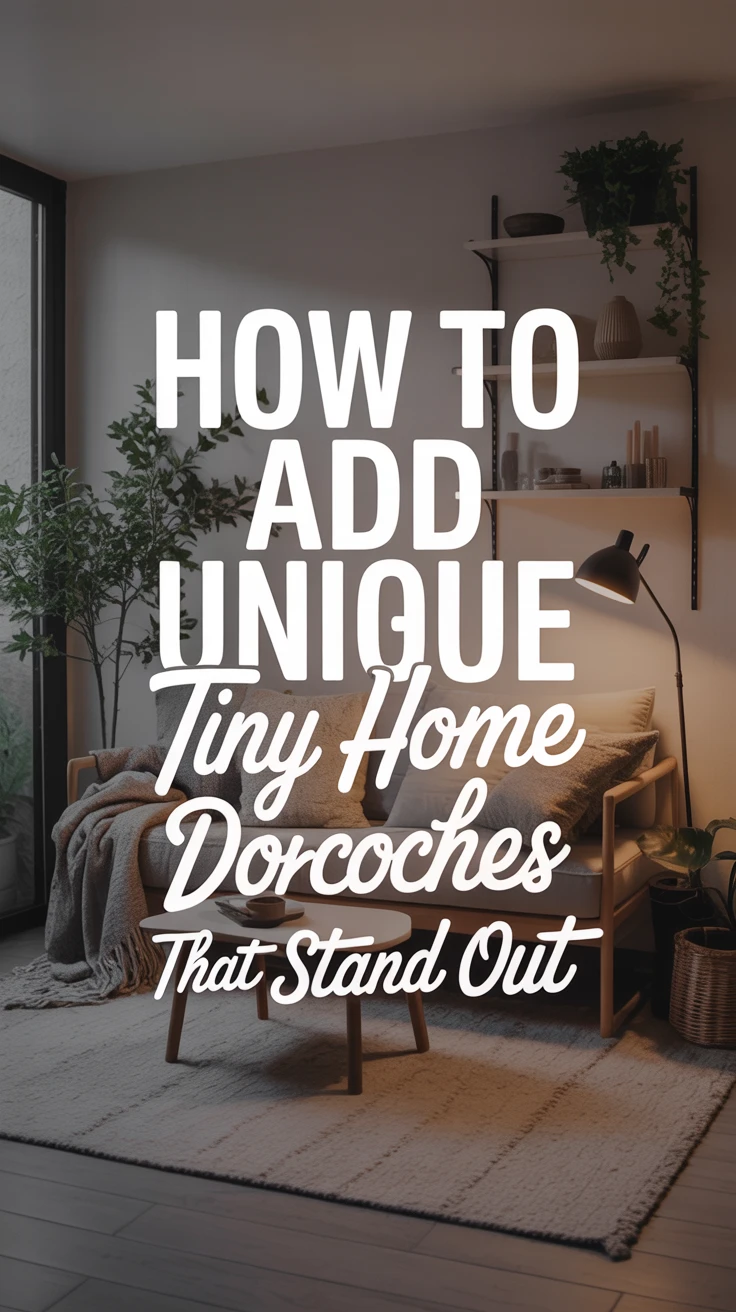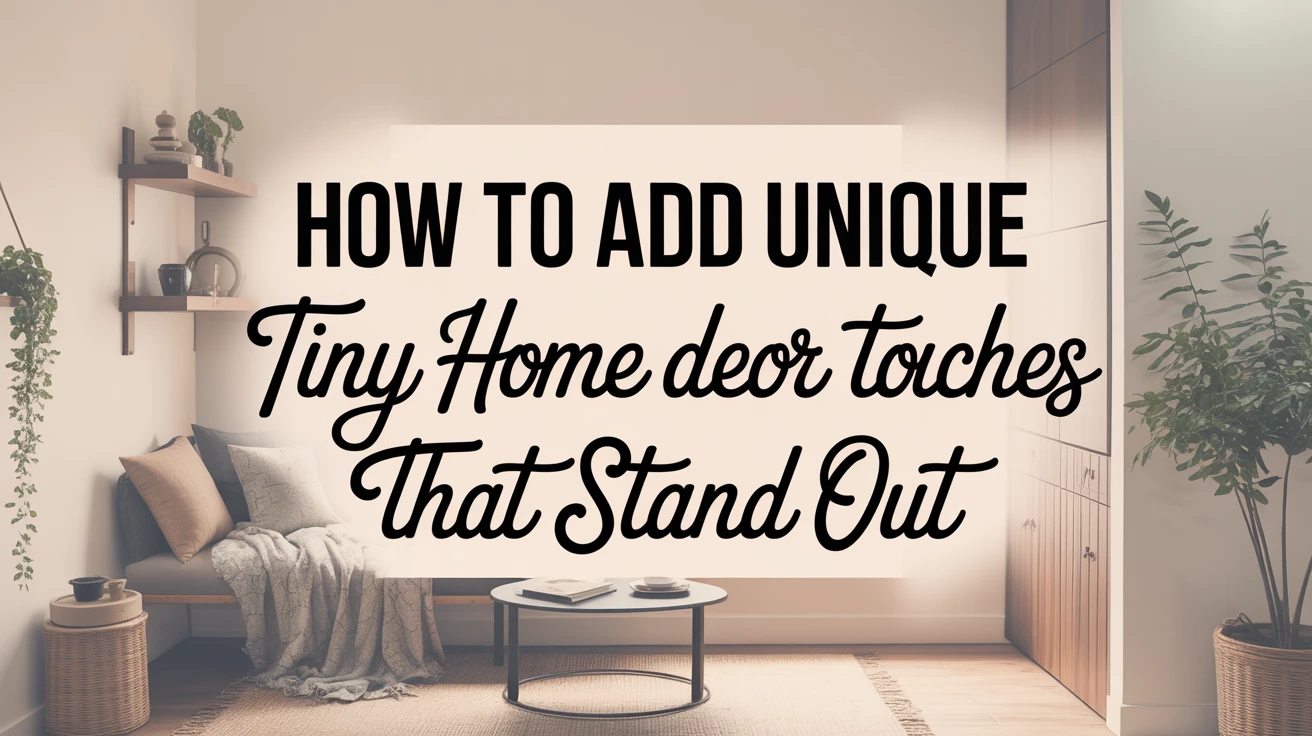
Introduction
Tiny homes have captured the imagination of many, offering a simpler, more sustainable lifestyle without sacrificing comfort and style. As someone who’s lived in a 400-square-foot space for over three years, I’ve learned that decorating a tiny home isn’t just about fitting everything in—it’s about creating a space that feels uniquely yours. The challenge lies in adding those special touches that make your compact dwelling stand out without overwhelming the limited square footage. In this article, I’ll share how to incorporate unique tiny home decor elements that reflect your personality while maximizing functionality. From my own trials and errors, I’ve discovered that the most successful tiny spaces balance practicality with personal expression, turning spatial constraints into creative opportunities.

View on AmazonAs an Amazon Associate, I earn from qualifying purchases.

View on AmazonAs an Amazon Associate, I earn from qualifying purchases.
Embrace Multifunctional Furniture
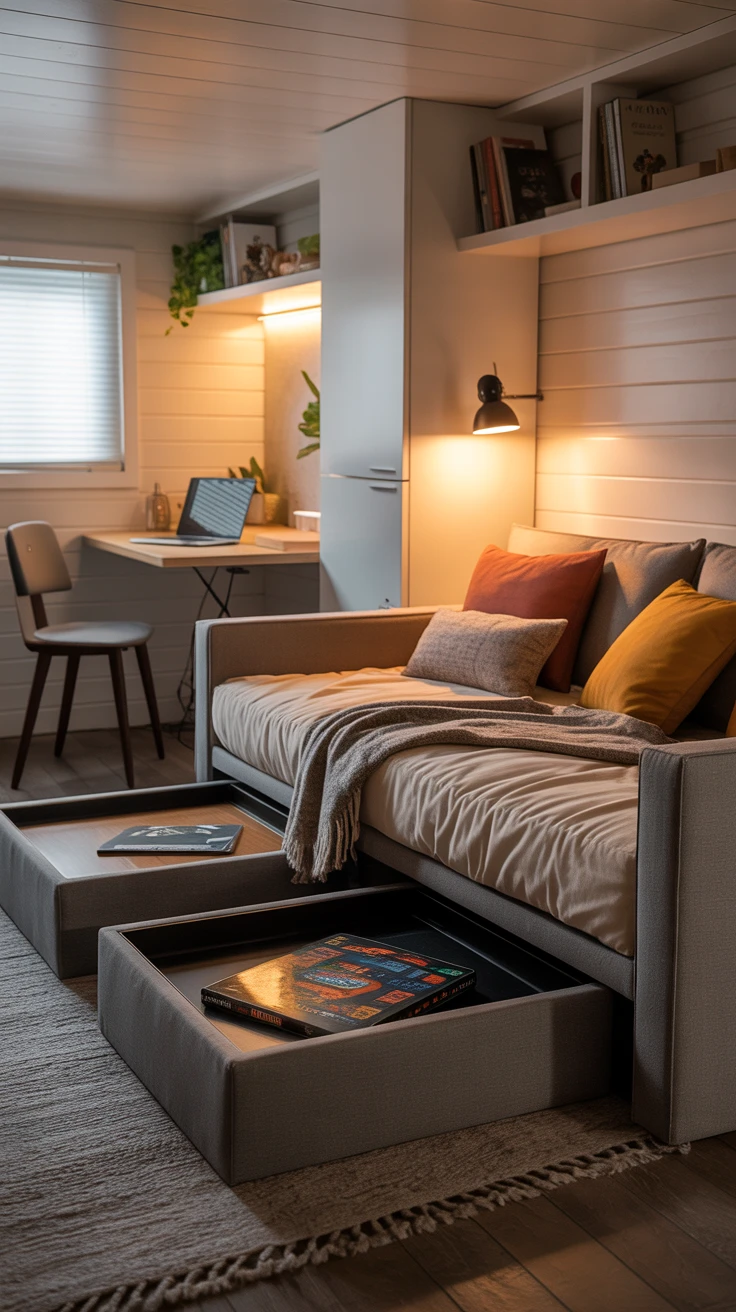
When I first moved into my tiny home, I made the rookie mistake of bringing traditional furniture pieces that quickly made the space feel cramped. I’ve since learned that in tiny living, every piece should earn its keep—preferably twice over!
- Convertible Seating: Invest in sofas that transform into beds or benches with hidden storage compartments.
- Expandable Tables: Choose dining tables that can fold down or extend based on your needs.
- Nesting Furniture: Utilize nesting tables or stools that can be tucked away when not in use.
- Wall-Mounted Desks: Install fold-down workspaces that disappear when your workday ends.
I particularly love my storage ottoman that serves as a coffee table, extra seating, and houses my collection of board games. The key is selecting pieces that complement your aesthetic while pulling double duty.

View on AmazonAs an Amazon Associate, I earn from qualifying purchases.

View on AmazonAs an Amazon Associate, I earn from qualifying purchases.
Pro Tip: When shopping for multifunctional furniture, prioritize quality over quantity. I once purchased a cheap sofa bed that became uncomfortable after just a few months. Investing in well-made pieces saves money and frustration in the long run.
Use Creative Storage Solutions
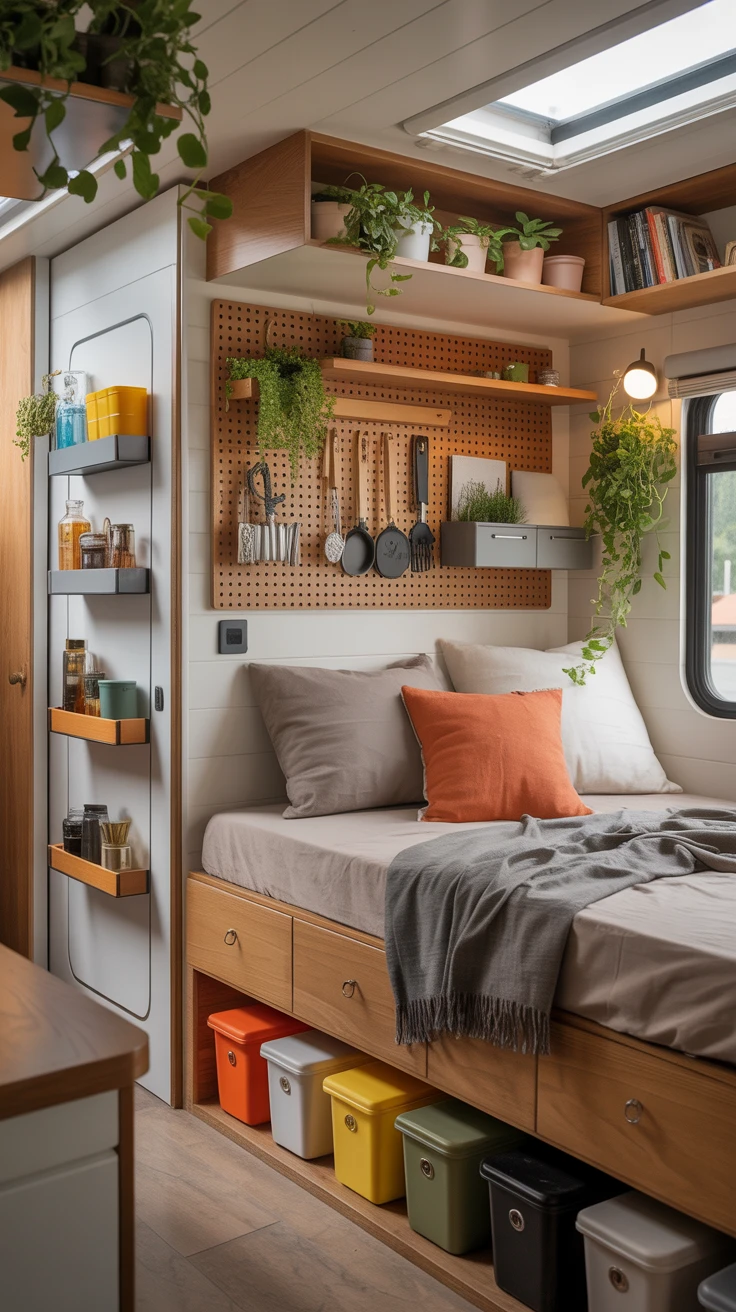
Storage is perhaps the greatest challenge in tiny home living. After struggling with clutter for months, I discovered that thinking beyond conventional storage options opened up a world of possibilities.
- Vertical Space: Install floating shelves, pegboards, or wall-mounted baskets to utilize wall real estate.
- Under-Stair Storage: Transform the area beneath stairs into pull-out drawers or custom cabinets.
- Ceiling Storage: Hang pots, plants, or rarely-used items from overhead racks.
- Magnetic Strips: Use these for kitchen knives, spice containers, or metal tools.
- Door Organizers: Attach slim organizers to the backs of doors for additional storage.
My favorite storage solution has been installing a platform bed with custom drawers underneath. This single change reclaimed nearly 25 cubic feet of storage space without sacrificing any floor area.

View on AmazonAs an Amazon Associate, I earn from qualifying purchases.

View on AmazonAs an Amazon Associate, I earn from qualifying purchases.
Pro Tip: Use clear containers for stored items you access regularly. This small change has saved me countless hours of searching through opaque bins for that one specific item I needed.
Highlight with Bold Colors and Patterns
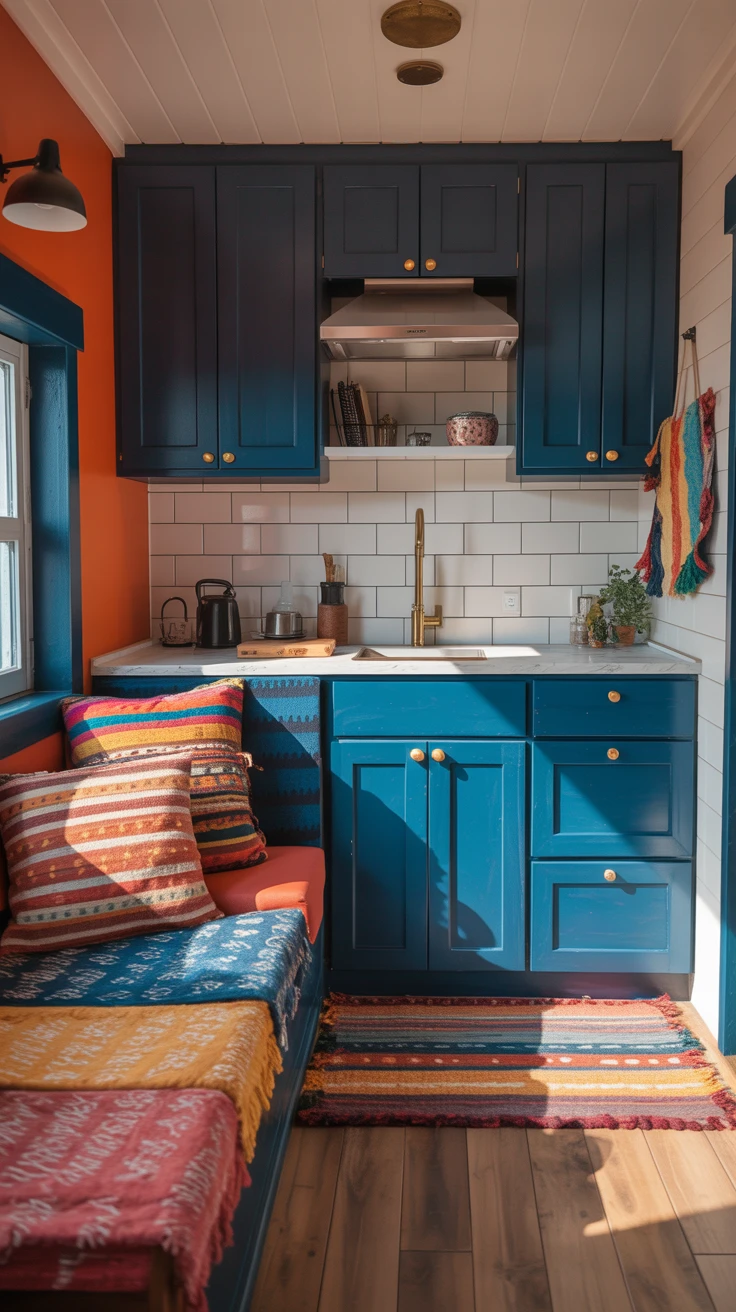
Contrary to popular belief, small spaces don’t have to be all white. In fact, strategic use of color and pattern can create depth and character in a tiny home. I initially painted everything white, thinking it would make my space feel larger, but it ended up feeling sterile and impersonal.
Bold color choices can define different zones in an open-concept tiny home. Consider an accent wall in your sleeping area or a vibrant backsplash in the kitchen. Patterns, when used judiciously, add visual interest without requiring additional space.
I painted my kitchen cabinets a deep navy blue, which anchors the space and makes my white countertops and brass hardware pop. The transformation was remarkable—suddenly, my kitchen felt intentional rather than merely functional.
Remember that in small spaces, a little color goes a long way. If you’re hesitant to commit to permanent changes, try incorporating unique tiny home decor through colorful textiles or removable wallpaper first.
Incorporate Natural Elements
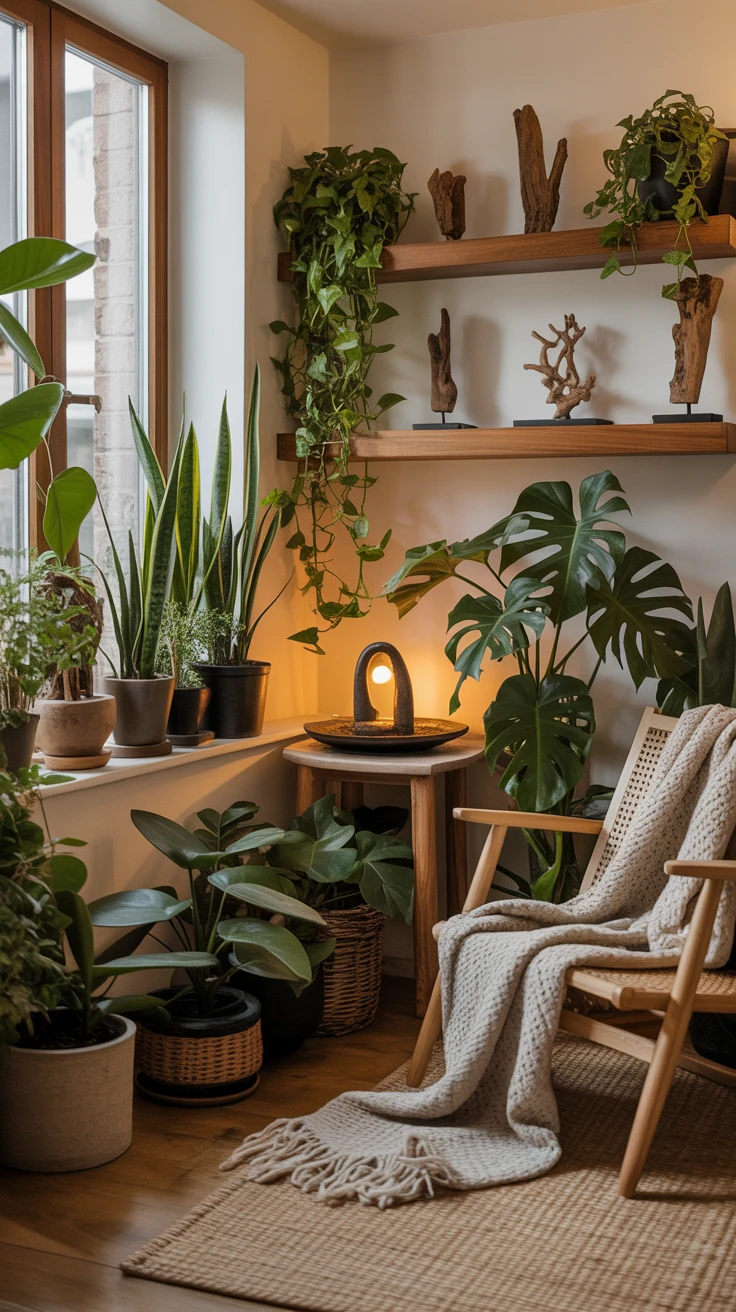
Natural elements bring warmth, texture, and life to tiny spaces. After spending months in my perfectly organized but somehow soulless tiny home, adding elements from nature transformed the atmosphere completely.
- Indoor Plants: Choose varieties appropriate for your light conditions and space constraints.
- Wood Accents: Incorporate wooden shelving, furniture, or decorative objects.
- Stone Elements: Consider a stone backsplash or decorative pebbles in plant containers.
- Natural Textiles: Use cotton, linen, wool, or jute in your soft furnishings.
- Water Features: Small tabletop fountains add a calming presence and improve air quality.
My collection of succulents requires minimal care but adds vibrant green life to my windowsills. I’ve also incorporated driftwood pieces I’ve collected from beach trips as wall art, creating personal mementos that double as decor.

View on AmazonAs an Amazon Associate, I earn from qualifying purchases.

View on AmazonAs an Amazon Associate, I earn from qualifying purchases.
Pro Tip: For those without a green thumb, air plants and ZZ plants are nearly indestructible options that thrive with minimal attention while still providing the benefits of living greenery.
Personalize with DIY Decor
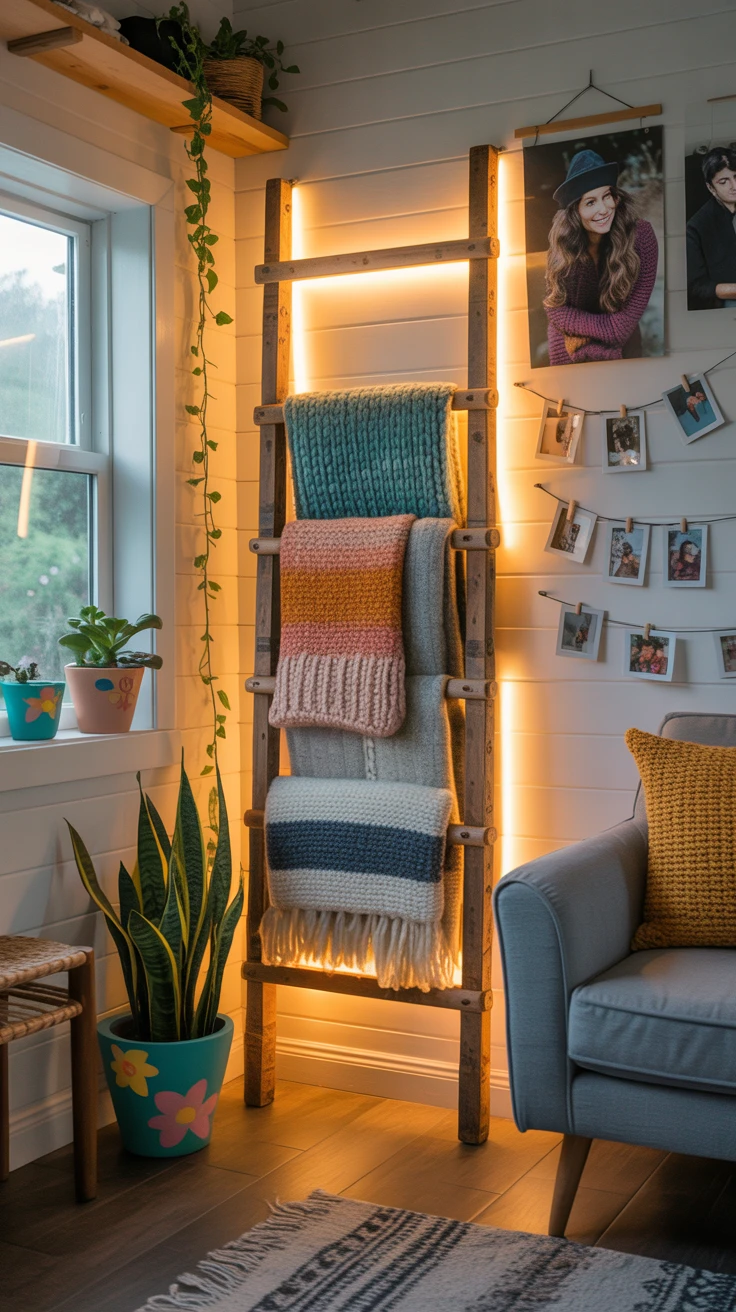
Nothing makes a space more uniquely yours than items you’ve created yourself. DIY projects not only save money but also result in one-of-a-kind pieces that tell your story. I’ve found that these personal touches are what visitors comment on most in my tiny home.
Start with simple projects like hand-painted plant pots or custom photo displays. As your confidence grows, you might tackle more ambitious projects like building a headboard or creating custom shelving.
One of my favorite DIY projects was transforming an old ladder into a blanket rack with integrated lighting. The project cost less than $50 but created a functional piece that perfectly fits my space and style.
Don’t be afraid to make mistakes—my first attempt at building floating shelves was a disaster that required patching several unnecessary holes in my wall! But the second attempt yielded shelves that perfectly fit an awkward corner and now display my favorite books and mementos.
Mix and Match Textures
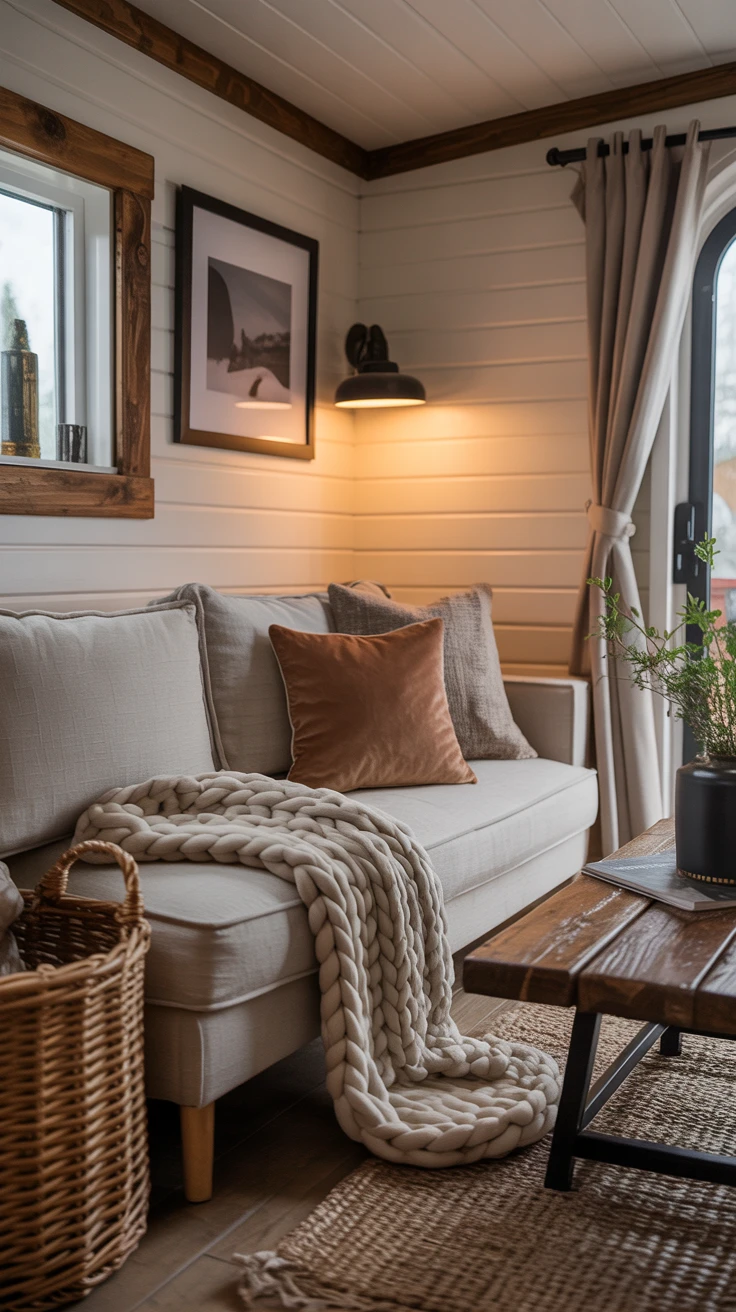
In a small space where expansive design statements aren’t possible, texture becomes an essential tool for creating visual interest and depth. I’ve found that thoughtfully combining different textures makes my tiny home feel more luxurious and layered.
Consider contrasting smooth surfaces like glass or polished metal with rougher elements such as woven baskets or knotty wood. Layer soft textiles of varying weights and finishes—perhaps a chunky knit throw over a linen sofa with velvet accent pillows.
I once made the mistake of choosing too many similar textures, resulting in a flat, uninspiring space. Now I make sure each room includes at least three different textural elements, creating a more dynamic environment without requiring additional square footage.

View on AmazonAs an Amazon Associate, I earn from qualifying purchases.

View on AmazonAs an Amazon Associate, I earn from qualifying purchases.
Pro Tip: Balance is key when mixing textures. I follow a rule of thirds—one-third smooth textures, one-third soft textures, and one-third rough or natural textures—to create a harmonious space that feels intentional rather than chaotic.
Employ Art and Wall Decor Effectively
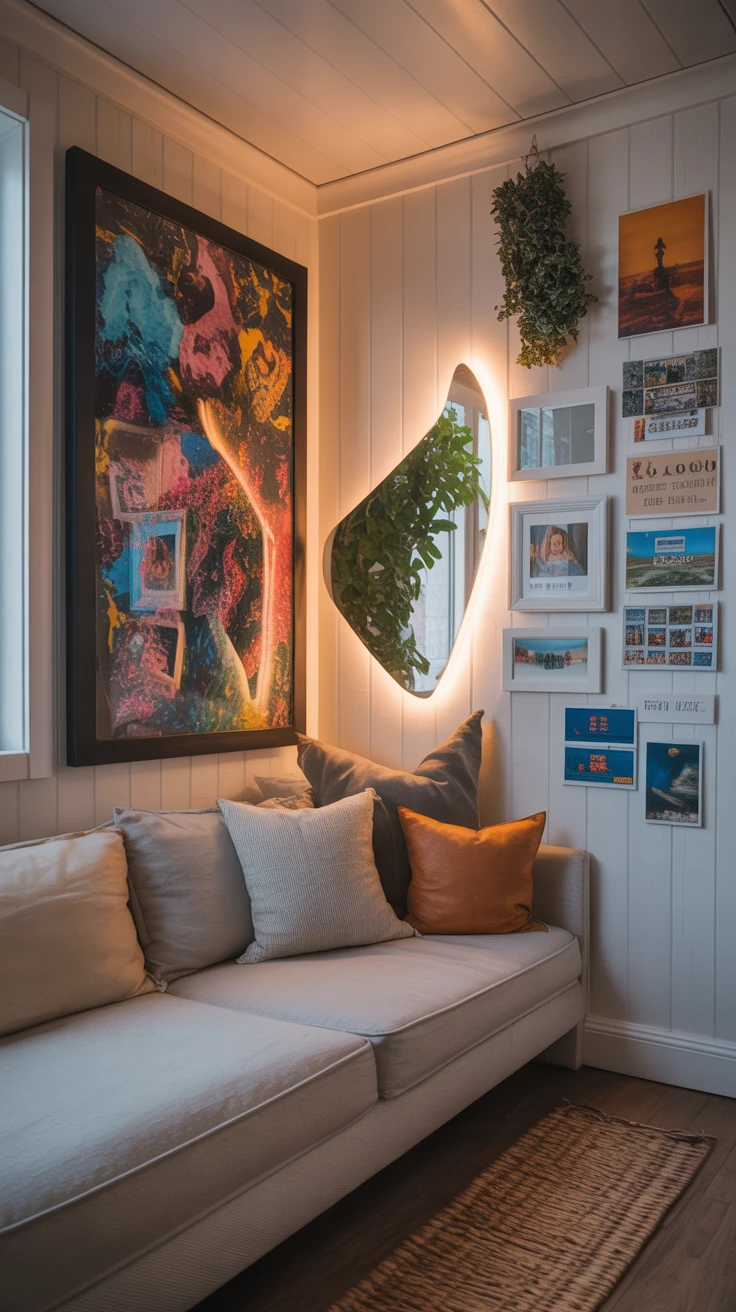
Wall space is precious real estate in unique tiny home decor schemes. Using it effectively can dramatically transform your space without consuming valuable floor area. I’ve experimented with various approaches to wall decor and found that being selective but bold yields the best results.
Rather than hanging many small pieces, consider one larger statement piece that can serve as a focal point. Alternatively, create a cohesive gallery wall that tells a story or reflects your interests. Mirrors are particularly valuable in tiny spaces, as they reflect light and create the illusion of expanded space.
I’ve created a gallery wall using frames in varying sizes but a consistent color palette, displaying a mix of personal photos, postcards from travels, and small original artworks. This single wall tells my story more effectively than dozens of scattered decorative objects could.
Don’t forget to consider three-dimensional wall decor options like sculptural pieces, wall-mounted plants, or textile hangings that add depth and interest to your vertical surfaces.
Conclusion
Creating a tiny home that stands out doesn’t require grand gestures or unlimited space—just thoughtful attention to details that reflect your personality and lifestyle. By embracing multifunctional furniture, implementing creative storage, using color strategically, incorporating natural elements, personalizing with DIY projects, mixing textures, and making the most of your wall space, you can create a tiny home that feels both unique and functional.
Remember that unique tiny home decor is less about following trends and more about creating a space that works for your specific needs while expressing your individual style. My own tiny home continues to evolve as I learn more about what works best for my lifestyle, and I encourage you to approach your space with the same spirit of experimentation and personal expression.
The beauty of tiny living is that small changes can have a big impact—so don’t be afraid to try new ideas and make your compact space truly your own.
Frequently Asked Questions
How can I make my tiny home decor unique on a budget?
Focus on DIY projects, thrift store finds, and repurposing items you already own. Some of my most commented-on decor pieces are vintage items I’ve restored or transformed. Also consider seasonal natural elements like branches, pinecones, or flowers that can be foraged for free and rotated throughout the year.
What are some space-saving tips for tiny home interiors?
Look for “dead spaces” that could be utilized, such as the area above kitchen cabinets or under furniture. Install hooks on the sides of cabinets or furniture for hanging items. Use vacuum storage bags for off-season clothing or bedding. Consider furniture with exposed legs to create a sense of openness and utilize the space underneath for storage baskets.
How do I choose the right color scheme for a tiny home?
While light colors generally make spaces feel larger, don’t be afraid to incorporate deeper hues in strategic locations. Consider your natural light sources and how colors appear throughout the day. I recommend choosing a neutral base palette with 2-3 accent colors that can be incorporated through easily changeable items like pillows, throws, or artwork.
Can I use large art pieces in a small space?
Absolutely! One large piece can actually make a space feel larger and more cohesive than several small pieces. The key is ensuring proper scale—the artwork should be proportional to the wall space available. In my experience, a single large canvas or framed print can become a stunning focal point that draws the eye and adds depth to a tiny space.
What are some quick DIY decor ideas for tiny homes?
Create custom drawer pulls using materials that reflect your interests. Paint thrifted picture frames in coordinating colors for a cohesive gallery wall. Make your own concrete planters using plastic containers as molds. Create a hanging herb garden with mason jars and decorative brackets. Customize plain lampshades with fabric, paint, or decoupage techniques that complement your color scheme.
